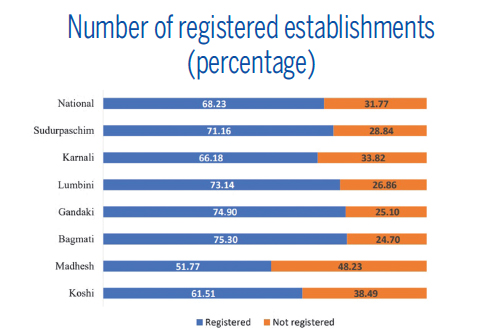Money
A third of wholesale and retail trades still unregistered
The number of registered trade establishments has grown from 44 percent in 2018 to 68 percent in 2022, largely due to the tax waiver schemes.
Post Report
Nearly one-third of wholesale and retail trade in Nepal is unregistered, a new survey has shown.
According to the Nepal Distributive Trade Survey, 2022, unveiled by the National Statistics Office, formerly the Central Bureau of Statistics, on Friday, of the total 498,058 trade establishments (wholesale and retail) across Nepal surveyed, the number of registered trade establishments is 68.23 percent, while 31.77 percent remain unregistered.
Distributive trade refers to the wholesale and retail trades and the repair of household goods and motor vehicles.
The survey covered wholesale and retail trade of motor vehicles and motorcycles and repair and other wholesale and retail trades. This survey was conducted just after the Covid pandemic.
The number of registered trade establishments, however, was 44 percent in the National Economic Census, 2018.
“The proactive role played by the local governments to increase the revenue is the key reason behind the rise in the registration of the establishments in the last four years,” said Jishnu Mohan Bhattarai, director at the National Statistics Office.
He said that tax waiver schemes and other benefits launched by local governments have encouraged people to register their businesses.
The first distributive trade survey was conducted in 2008. This is the second survey conducted after a 14-year hiatus.
After agriculture, wholesale and retail trade is the second-highest contributor to Nepal’s gross domestic product (GDP) whose contribution stood at 15.39 percent in the last fiscal year 2022-23.
According to the survey, the number of trade registrations is higher in Bagmati province with 75.30 percent of trade establishments being registered.
Madhesh province has low trade registration with only 51.77 percent registered establishments.
Out of the total retail establishment, 66.62 percent have been registered. Similarly, out of total wholesale establishments, 93.58 percent are registered.
The survey said that 77.46 percent of the motor trade and repair shops are registered.
According to the survey, the total number of persons engaged in the wholesale and retail trade is 1.13 million. Out of them, 726,681 persons (64 percent) were male and 403,964 (36 percent) were female. On average, two persons are engaged in each establishment.
The engagement of women in trade is less compared to men, the survey showed.
Women's engagement in the distributive trade sector is an important indicator for accessing women empowerment and gender equality within this field, the survey report said.
The survey depicts that among the total persons engaged, 403,964 (36 percent) were female.
The highest proportion of women were involved in retail trade followed by wholesale trade and then motor and vehicle trade and repair businesses.
The engagement of women in retail trade was 38.73 percent compared to 64.27 percent of men.
In wholesale trade, women's engagement is just 19.06 percent compared to 80.94 percent of men.
In motor trade and repair women's engagement is 10.94 percent compared to 89.06 percent of men.
The highest percentage of women engaged in distributive trade was in Karnali province with 54.1 percent compared to 45.9 percent of men. It was followed by Gandaki and Bagmati province.

Women's engagement in distributive trade is lowest in Madhesh province, the survey report showed.
Bhattarai said that most of the men of Karnali province migrate for work to neighboring countries which led to a rise in women's engagement in distributive trade.
On average, 74 percent of distributive trade establishments were owned by males, while 26 percent were owned by women.
Madhesh province has the highest number of distributive trade establishments owned by men with 89.2 percent while women-owned trade was just 10.8 percent.
Gandaki province has the lowest number of distributive trade establishments owned by men with 64.9 percent while women-owned were 35.1 percent.
Of the ownership distribution among retail trade establishments, 27 percent are owned by women, while 73 percent are owned by males.
In wholesale trade establishments, 17 percent have women ownership, contrasting with the substantial 83 percent owned by males.
In the motor trade sector, 91 percent of establishments are owned by males, with only 9 percent under women's ownership.
According to the survey report, out of the total 1.13 million persons engaged, only 19.42 percent were paid while 80.58 percent were unpaid.
Bhattarai said that most of the distributive trade establishments are owned by the family, and they don’t pay for the family members.
Among the paid employees, 60.60 were male and 39.40 percent were female. Among the unpaid employees, 79.50 were male and 20.50 percent were female.
The national average annual wages and salaries paid to employees in the reference year was Rs208,494, the survey report said. The average monthly wages and salaries paid per employee was Rs17,374.
According to the survey report, the average annual operating cost per establishment was Rs264,373 in the reference year.
Among the provinces, Bagmati province had the highest average annual operating cost per establishment at Rs470,340, followed by Karnali province at Rs243,796.
On the other hand, Madhesh province had the lowest average annual operating cost per establishment at Rs126,801, followed by Koshi province’s Rs155,283.
The main objective of the survey is to find the trade margin of the individual commodity distributed in the market, said Bhattarai.




 14.12°C Kathmandu
14.12°C Kathmandu












